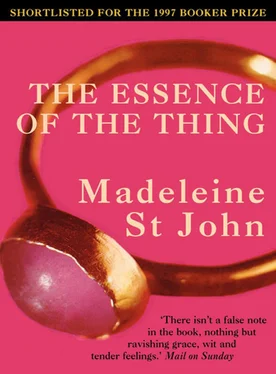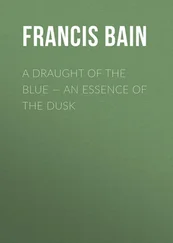‘Then bloody go and get into it and drive away, then! Splendid, he says! Splendid! Wants horsewhipping! Croissants! London! Horsewhipping!’ Hugo flapped the newspaper straight with a loud crack and barricaded himself behind it. ‘Croissants!’ he muttered.
‘Excuse me,’ said Jonathan, getting up. He went out into the garden and walked about slowly, happily. It had taken years for him to learn that when they wind you up, the thing to do is wind them right back. Croissants – French croissants! Glorious! Splendid!
The splendour passed; Jonathan was possessed once more by the familiar demon whose dark oppressing wings enfolded his mind. He sat down on a garden seat and leaned back, closing his eyes against the bright spring sunshine, listening to the countryside sounds, trying, failing, to shun thought, recollection, reflection. Why this abiding darkness? Wasn’t the worst over and done? Nicola, for all he now knew, might be gone, out of his sight, when he returned to London the following evening; he might even now be effectively free: free of all the terrible demands of that scrutiny, that intimacy, that sharing of the self. Free, and alone: to be alone was to be free.
Suddenly the weight of a human being fell on to the seat beside him and a voice loudly spoke to him. ‘Ah! here you are!’ It was his mother, whose approach had been silenced by the lawn across which she had advanced. Oh, God . No matter where one was, there was someone, some woman, peering into one’s soul. It was intolerable. He had even (so he fancied) caught his secretary apparently at it. They peered into one’s soul and left one naked and helpless.
He sat up. ‘I was just thinking of going for a walk,’ he said. ‘Oh, but do stay for a moment now I’m here,’ she said. ‘Do tell me how Nicola is getting on. Such a pity she couldn’t come with you, when the weather’s so nice.’ What a pity you are not married: have no children: aren’t happier to be here: but see how tolerant we are, have always been; how tolerant, how patient. All the younger generation seem to be the same, all living together without benefit of clergy. Of course they settle down in the end. Mostly. When would Jonathan’s end arrive, though? It was taking such a very long time. And why no Nicola this weekend, after all? ‘She always enjoys the garden so much, doesn’t she?’ she went on. ‘Yes,’ said Jonathan. ‘I suppose she does.’
‘So she’s quite well, is she?’ Not quite what we would have liked for Jonathan, ideally , but still, quite a nice girl. Quite a nice girl. Highly educated, of course; as they all are these days – funny, isn’t it? ‘Yes,’ said Jonathan. ‘She’s fine.’ ‘Good,’ said his mother. ‘Well, you must make sure you bring her next time.’ ‘Yes,’ said Jonathan. ‘Sure thing.’ Oh ho. You bet. Sorry, Ma.
On Saturday (while Jonathan basked, ate, walked, fumed, bashed croquet balls between hoops, and intermittently gloated) Nicola cleaned out all the kitchen cupboards. She cleaned the gas cooker, especially the oven. She even washed down all the paintwork, including the skirting boards, and she did two loads of washing, back to back. Then she washed her hair.
Mrs Brick had been in a few days before so there wasn’t a lot to be done to the rest of the flat, but she did what there was, and a little more besides. On Sunday morning she polished the mirrors and the insides of the window panes and the television screen, and she washed all the china dogs and put them back on the mantelpiece in slightly different positions. After lunching off a tuna sandwich and an orange (Jonathan had overdone roast lamb and apple pie) she settled down to the ironing. She was getting through the time nicely.
She was just beginning on Jonathan’s shirts (ah! Jonathan’s shirts: God wears the exact same kind) when the telephone rang.
‘Nicola? It’s Lizzie.’
‘Oh, Lizzie.’
‘How are you?’
‘I’m well, thanks, Lizzie. Are you?’
‘Yes, I’m well too. Listen, darling, about next weekend.’
Oh God oh God .
‘Ye-e-es?’
‘Oh, dear, had you forgotten? I know we’ve messed you about so much, but we’ve just decided that we’ll have to make it the weekend following after all. That’s Easter, we thought we’d go down on Saturday and stay till Monday night. Will you be free? We can always defer it again if you’re not but it would be nice if you were.’
‘I’m not quite sure, I’ll have to ask Jonathan.’
‘Oh, of course. Could you ask him now so that we can settle it?’
‘That’s a bit tricky. He isn’t here.’
‘Not there? Well, ask him as soon as he comes in and ring me back.’
‘I’m not sure … I’m not quite sure when he’s going to be back, he may be rather late.’
‘Goodness, has he gone away without you?’
‘More or less.’
‘Darling, you do sound odd. Is anything wrong?’
‘Not really.’
‘Darling, you sound as if you might be about to cry. Do tell me what has happened.’
‘I can’t.’ She was about to cry. She had thought her tears were all shed. She had assured herself that once the ironing was done, and the evening had fallen, and Jonathan had returned, and she and he had talked, properly talked, to each other, everything would be normal again. Normal and nice. They would be a normal, nice couple again, and could make amicable arrangements again, and accept amicable invitations, as normal, like this one, from Lizzie and Alfred Ainsworth, to spend a weekend at their cottage (their poky little cottage where Jonathan kept banging his head and their little vixen of a daughter woke them up at five in the morning: but still. The scenery was divine).
She was on the verge of tears, as long as she tried to speak, because underneath her assurance that everything would (in just a few hours’ time) return to niceness and normality was the black dread that it never would, and never could. No matter how beautifully she might iron Jonathan’s shirts.
‘Oh, Nicola, I don’t like the sound of this. Listen, I’m going to come round, I have to fetch Henrietta from Battersea later on anyway. So you stay just where you are, I’m going to go straight out and get into the car and whizz straight round. I’ll be with you before you know it.’ And Lizzie hung up, just like that. Nicola flopped down on to the sofa and began to cry. She had a good fifteen minutes to shed her tears and dry them too, because Lizzie was coming all the way from Islington. Lizzie was one of those women who like to be at the scene.
But her tears did not last so long this time as they had before. If I can manage to finish ironing that shirt that I’d just started, she thought, looking across the room at the ironing board, by the time Lizzie gets here then that will mean that everything is going to be alright: and she went back to the ironing board, and ironed as quickly as she knew how; but it won’t count, she admonished herself, if I don’t do it properly. No skimping. And she was as careful as ever with the sleeves, the really awkward part. She finished a moment before the buzzer sounded, heralding Lizzie. Everything was going to be alright.
‘Oh, Lizzie.’
‘Oh, Nicola. Now what is all this about?’
‘It’s nothing really. You shouldn’t have come.’
‘I like that. Shall I go away again then?’
‘No, stay and have some tea anyway.’
‘Alright. Goodness, how clean and tidy it looks here.’
‘Well, there’s the ironing – sorry about that, I’d just started—’
‘Goodness. Ironing as well. You are a treasure. I hope Jonathan’s grateful. His shirts, I see.’
Читать дальше












